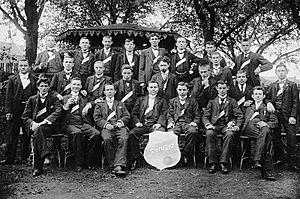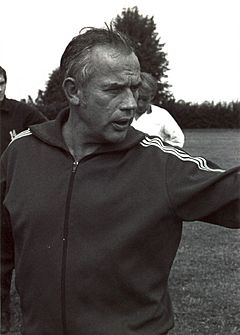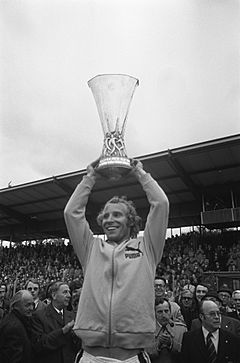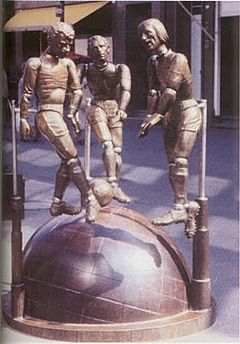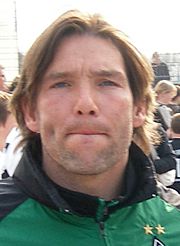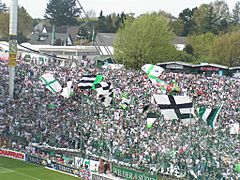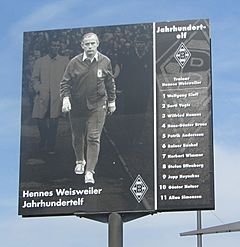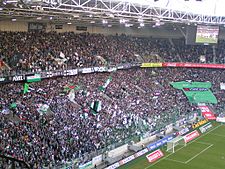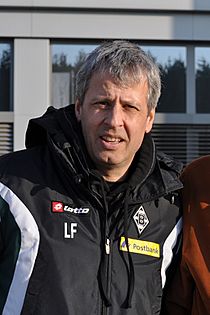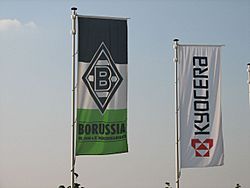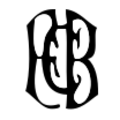Borussia Mönchengladbach facts for kids
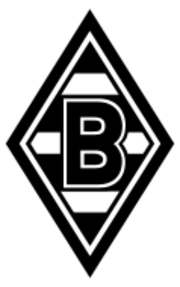 |
|||
| Full name | Borussia Verein für Leibesübungen 1900 e.V. Mönchengladbach | ||
|---|---|---|---|
| Nickname(s) | Die Fohlen (The Foals) Die Borussen (The Prussians) |
||
| Founded | 1 August 1900 (as FK Borussia 1900) |
||
| Stadium | Borussia-Park | ||
| Stadium capacity |
54,057 | ||
| President | Rolf Königs | ||
| Head coach | Gerardo Seoane | ||
| League | Bundesliga | ||
| 2020–21 | Bundesliga, 8th of 18 | ||
|
|
|||
Borussia Mönchengladbach is a professional football club from Mönchengladbach, North Rhine-Westphalia, Germany. Their full name is Borussia Verein für Leibesübungen 1900 e.V. Mönchengladbach. People often call them just Gladbach. They play in the Bundesliga, which is the top football league in Germany.
The club's nickname is Die Fohlen, which means "The Foals". This name came about because of their young, fast, and exciting playing style. Borussia Mönchengladbach has won many important titles. They have won the German league five times, the German Cup (called DFB-Pokal) three times, and the UEFA Cup (now UEFA Europa League) twice.
Borussia Mönchengladbach was founded in 1900. The name "Borussia" comes from "Prussia", a historical region in Germany. The team joined the Bundesliga in 1965. Most of their biggest successes happened in the 1970s. During that time, coaches Hennes Weisweiler and Udo Lattek led a young team with a quick and strong playing style. They won five Bundesliga titles and two UEFA Cups. They also reached the final of the European Cup in 1977.
Since 2004, Borussia Mönchengladbach has played at Borussia-Park. Before that, they played at the Bökelbergstadion from 1919. The club is one of the largest in Germany based on its number of members. In 2021, they had over 93,000 members. Their main rivals are 1. FC Köln, and their matches are known as the Rheinland Derby. Other rivals include Borussia Dortmund, Fortuna Düsseldorf, and Bayer Leverkusen.
Contents
- Club History: How it All Began
- Forming the Club (1899–1905)
- Before World War I (1905–1914)
- World War I (1914–1918)
- After the Wars: Rebuilding and Rise (1918–1965)
- Early Bundesliga Years (1965–1969)
- The Golden Decade (1970–1980)
- A Period of Change (1980–1996)
- Challenges and a New Stadium (1996–2010)
- A New Era of Success (2010–Present)
- Moving Up the Table (2017–Present)
- Club Culture and Fan Support
- Club Sponsors and Kit Manufacturers
- Players and Staff
- UEFA Club Rankings
- Club Achievements and Trophies
- Records and Statistics
- Players' Individual Honours
- Images for kids
- See also
Club History: How it All Began
Forming the Club (1899–1905)
In November 1899, a group of young men left their old sports club. On November 17, 1899, thirteen of them started a new club focused only on football. They met in a pub called Zum Jägerhof. They chose the name Borussia, which is Latin for "Prussia". Mönchengladbach was part of the Kingdom of Prussia. Other famous German clubs like Borussia Dortmund also chose this name.
In the early days, football was new in Germany. It was hard to find fields, goals, and equipment. Players often had to pay for their own gear. Borussia was the second football club in Mönchengladbach. The first was FC Mönchengladbach, founded in 1894. Borussia joined a Catholic sports group to help organize games. On August 1, 1900, they officially became Fussball Club Borussia 1900.
Being part of the group helped them play more official matches. They won against teams like Blitz Neuwerk and Rheydt FC. In 1902, Borussia even played international games in the Netherlands. They lost 0–2 to Helmondia Helmond but later drew 1–1 at home.
Football became very popular, but it caused some problems with the conservative Catholic group. Players wore shorts, and Sunday games sometimes meant missing church. So, Borussia left the group on May 24, 1903. They joined the Rhenish-Westphalian Sports Federation to keep playing organized football. They played against teams like Britannia Düsseldorf and BV Solingen.
In 1904, Borussia competed in a lower league. They won their district title in 1905 when their opponent, BV Solingen, did not show up for a game. On January 8, 1905, they also beat their city rival FC Mönchengladbach's third team 1–0. Borussia then played for the federation cup but lost to Kölner FC 99.
Before World War I (1905–1914)
After some good results in 1905, Borussia faced a problem: their playing field was not good enough. They were not allowed to play in major competitions until they found a better place. Borussia then got their own land on Reyerhütterstraße in Mönchengladbach. This was important because football was growing, and it helped them avoid issues with property damage and noise.
After more than a year, they started playing regularly again in the second class league. They won their first home game at Reyerhütterstraße against Preußen Krefeld. Borussia became district champions, winning eight out of eight games. However, they were not promoted and stayed in the second class due to a league change.
In 1907, Borussia moved again to a new ground near the Schweizerhaus. They had some good wins there, including a 5–1 victory over Borussia Köln. The season ended with them in third place. They played in a promotion tournament but lost 0–6 to Viktoria Mönchengladbach.
The 1908–09 season was much better. After an early loss, Borussia started winning. They beat Viktoria Mönchengladbach 4–1 away and had a huge 13–1 victory over Spiel und Sport Essen. They finished first in their league group. They then played against FC Cleve 06 for promotion. After winning 5–1 at home and losing 3–4 away, they won the tie-breaker 4–1. This finally earned them promotion to the first division!
For the 1909–10 season, Borussia changed their team colors from black and white to blue and yellow stripes. They struggled a bit in the higher league, but avoided being relegated. The club celebrated its tenth anniversary with a record 143 members.
In the 1910–11 season, the league grew to ten teams. Borussia played many games, including friendly matches, which was tough for amateur players. They had a big 11–2 win over rivals Rheydt SV. They also had to move their playing ground again, this time to an area near the Catholic graveyard, which became known as Stadion am Rosengarten.
The 1911–12 season was a big success for the club. Borussia easily won their league with twelve wins, one draw, and one loss. This meant they could play for promotion to the Verbandsliga and the West German championship. They beat VfJuB Düren 4–2 and VfB 1900 Gießen 5–0. However, they lost the West German championship final 2–4 to Cologne BC 01, which later became their big rival, 1. FC Köln.
In the 1912–13 season, Borussia did not perform as well as the year before. They finished in the middle of the table, in sixth place, with eight wins, two draws, and eight losses. They were not in danger of relegation, but they also did not challenge for the title.
The last full season before World War I was 1913–14. The German football system changed, and Borussia was in the Rhenish Northern District league. They aimed to win the district championship but finished third. A highlight was a friendly match against English professional team Dulwich Hamlet. Borussia's amateur players lost 2–5, even though they were leading 2–1 late in the game.
World War I (1914–1918)
In March 1914, the club bought land called De Kull, which later became the site of the Bökelbergstadion. However, World War I stopped progress. Many players joined the military. With players constantly changing, Borussia still played games, including the war cup. In the 1914–15 season, they played 18 games despite the war.
By the 1915–16 season, it was clear the war would last longer. Borussia still managed to put together a team, often with players on leave from the front. They played against teams like Union Krefeld and FC Mönchengladbach. After a difficult start, they improved and briefly challenged for first place in January 1916. They finished second in the league. By mid-1916, Borussia had to stop playing regularly because they did not have enough players. By November 1916, even the club's leaders had to stop operations due to military service.
The war caused great sadness for Borussia. Their chairman since 1912, Heinz Körstgens, was killed in action in 1915. Stephan Ditgens, a player and uncle of future Germany national team player Heinz Ditgens, also died in the war.
After the Wars: Rebuilding and Rise (1918–1965)
After World War I ended in November 1918, football clubs slowly started up again. Borussia members had informal meetings about playing again even before the war ended. The first recorded game was a 5–0 win over Rheydt SV in August 1918. However, the occupation of the region by Belgian forces meant only seven of 14 planned games were played in 1918–19.
The search for a good playing field continued. In early 1919, the team temporarily returned to Schweizerhaus. On March 15, 1919, FC Borussia merged with another local club, Turnverein Germania 1889, becoming 1889 VfTuR M.Gladbach. In 1920, the club won its first major title, beating Kölner BC 3–1 to win the West German championship final. The merger only lasted two years. After that, the club was known as Borussia VfL 1900 e.V. M.Gladbach.
When the Nazi Party came to power in 1933, the German league system changed. Gladbach played in regional leagues. During this time, Heinz Ditgens became Mönchengladbach's first international player. He played for Germany in a 9–0 win over Luxembourg at the 1936 Olympic Games.
After World War II, Mönchengladbach started playing again in June 1946. They earned promotions, reaching the regional second tier in 1949 and the top league, the Oberliga West, in 1950. After many years of moving between leagues, Borussia won their first Oberliga title in the 1958–59 season.
In August 1960, Borussia Mönchengladbach beat 1. FC Köln in the West German Cup. Weeks later, the club won the DFB-Pokal, their first national trophy, by defeating Karlsruher SC 3–2 in the final. This win allowed Borussia to play in the European Cup Winners' Cup in 1960–61. They lost 11–0 on total score to the Scottish club Rangers.
The next year, the club took on its current name, Borussia VfL Mönchengladbach. In 1962–63, the club hoped to join the new Bundesliga, which was starting the following year. Helmut Beyer became president, and Helmut Grashoff became second chairman. To improve the club's finances, they sold player Albert Brülls for a record fee. This money helped coach Fritz Langner sign new players like Heinz Lowin and Siegfried Burkhardt. That year, the youth team, which included future stars Jupp Heynckes and Herbert Laumen, won the West German championship.
Borussia's results in the years before the Bundesliga started in 1963 were not strong enough for them to join the new top league right away. So, they played in the second tier, the Regionalliga West.
In the 1964–65 season, the club signed young players Jupp Heynckes and Bernd Rupp. Some youth team players also joined the main squad. The team's average age was only 21.5 years, the youngest in the league. Because of their young age and exciting, successful play, reporter Wilhelm August Hurtmanns nicknamed them "foals" in his newspaper articles. By April 1965, the team won the Regionalliga West. This meant they qualified for the Bundesliga promotion round. They won three of their six games and secured promotion to the Bundesliga. Bayern Munich also earned promotion that year.
Mönchengladbach started playing in the Bundesliga in the 1965–66 season. They were promoted alongside Bayern Munich, and the two clubs soon became strong rivals. Bayern won the Bundesliga in 1969. Mönchengladbach quickly responded, winning their first championship the very next season and a second title in 1971. They were the first Bundesliga club to successfully defend their title.
Early Bundesliga Years (1965–1969)
The arrival of Hennes Weisweiler as coach was key to the club's success. The club did not have a lot of money for star players. Weisweiler focused on developing young talent. He did not force players into a strict system. Instead, he encouraged their individual skills and gave them freedom on the field. This led to their exciting, attacking style of play, which became the trademark of the "Fohlenelf" (Foal Eleven).
The club signed Berti Vogts and Heinz Wittmann, who would become very important players for Borussia. Their first Bundesliga match in the 1965–66 season was an away game against Borussia Neunkirchen, ending in a 1–1 draw. Gerhard Elfert scored Borussia's first Bundesliga goal. They won their first home game 5–0 against SC Tasmania 1900 Berlin. Borussia finished their first Bundesliga season in 13th place.
In the 1966–67 season, Mönchengladbach showed their strong attacking power, scoring 70 goals. Herbert Laumen scored 18 goals, Bernd Rupp 16, and Jupp Heynckes 14. The team finished eighth in the league. They also achieved their highest-ever Bundesliga victory at the time, an 11–0 home win over FC Schalke 04.
Success meant player salaries increased, making it hard to keep top players. Jupp Heynckes moved to Hannover 96 for a record fee. Bernd Rupp went to SV Werder Bremen, and Gerhard Elfert joined Eintracht Braunschweig. The club signed Peter Meyer and Peter Dietrich to replace them. In the 1967–68 season, they had another big win, 10–0 over Borussia Neunkirchen. The team finished third in the league that season and the next. In 1968–69, the club signed future coach Horst Köppel, goalkeeper Wolfgang Kleff, and players like Hartwig Bleidick and Winfried Schäfer.
The Golden Decade (1970–1980)
The 1970s were the most successful years in the club's history. Under coach Hennes Weisweiler, the young team played an attacking and powerful style of football that attracted fans from all over Germany. Borussia won the German championship five times during this period, more than any other team. A strong rivalry also grew with Bayern Munich, as both clubs had been promoted to the Bundesliga in 1965.
After finishing third twice, Weisweiler focused on strengthening the defense in the 1969–70 season. Borussia bought experienced defenders like Luggi Müller and Klaus-Dieter Sieloff. They also signed their first Danish player, Ulrik le Fevre, who was later joined by Henning Jensen and Allan Simonsen. This season saw their first Bundesliga victory over Bayern. On October 31, 1969, after a 5–1 win over Alemannia Aachen, Borussia topped the Bundesliga table for the first time.
On April 30, 1970, Borussia won the championship with a home victory against Hamburger SV. On September 16, 1970, Herbert Laumen scored Borussia's first goal in European club football in a 6–0 win against EPA Larnaca. In the 1970–71 season, they only lost one game in the first half. A famous incident happened on April 3, 1971, in a home game against Werder Bremen. After a play near the goal, striker Herbert Laumen accidentally knocked over the left goal post. The game was stopped at 1–1 because the goal could not be fixed. The DFB sports court later ruled it a 2–0 win for Bremen. As a result, clubs were required to have a spare goal. Nine weeks later, on June 5, 1971, Borussia became the first team in Bundesliga history to successfully defend their championship title, with a victory against Eintracht Frankfurt.
On October 20, 1971, in the European Cup, Borussia played against Inter Milan. Borussia won the match at Bökelbergstadion 7–1. However, UEFA canceled the game because Inter Milan striker Roberto Boninsegna was hit by an empty coke can. After a 4–2 away defeat in Milan and a 0–0 draw in the replay in Berlin, Borussia was eliminated from the competition.
Die Fohlen won their second DFB-Pokal in 1973, beating 1. FC Köln 2–1 in the Rheinland derby with a goal from Günter Netzer. This was Netzer's last game for Borussia before he moved to Real Madrid.
Borussia played in their first international final on May 9, 1973, in the UEFA Cup. Liverpool won the first leg 3–0. On May 23, 1973, Borussia Mönchengladbach won the second leg 2–0, but Liverpool won the cup based on the total score.
The next seasons saw some key players leave, but the main striker, Jupp Heynckes, stayed. In the 1973–74 season, Heynckes was the Bundesliga's top scorer with 30 goals. Borussia finished second to Bayern Munich by one point. They scored a club record of 93 goals that season.
In the 1974–75 season, Borussia started a remarkable run. They topped the league table on Matchday 17 and stayed there, winning the championship on June 14, 1975. However, coach Hennes Weisweiler left the club after eleven years to join Barcelona. Borussia played another international final on May 7, 1975. The first leg of the UEFA Cup final against Twente ended 0–0. Borussia won the second leg 5–1, winning their first international title.
Udo Lattek, who came from rival Bayern Munich, took over the club for the 1975–76 season. Lattek focused more on defense than Weisweiler. The team topped the championship table on the twelfth round and kept that lead, winning the season.
On March 3, 1976, Borussia Mönchengladbach played against Real Madrid in the European Champions Cup. The game ended 2–2. In the second leg on March 17, 1976, which ended 1–1, the referee did not allow two Mönchengladbach goals. The draw was enough for Real Madrid to advance.
The team won three league titles in a row from 1975 to 1977. On June 12, 1976, Mönchengladbach won their fourth league title. In the 1976–77 season, Lattek kept almost the same team. Goalkeeper Wolfgang Kleff was injured, so they signed Wolfgang Kneib. Borussia needed one point on the final day to defend their title. The match against Bayern Munich ended 2–2. Borussia achieved a "hat-trick" of titles, winning their fifth German championship on May 21, 1977. The Danish player Allan Simonsen was named Europe's Footballer of the Year that season.
The team almost won a fourth consecutive championship in the 1977–78 season. Mönchengladbach lost out to 1. FC Köln only because of a worse goal difference. Borussia won their final game against Borussia Dortmund 12–0, which is still the highest victory in Bundesliga history. However, 1. FC Köln won their last game 5–0, giving them a slightly better goal difference and the championship.
Although Mönchengladbach lost the 1977 European Cup final to Liverpool, they also played in four UEFA Cup finals. They won in 1975 and 1979, and lost in 1973 and 1980. The club's amazing run of winning eight trophies had come to an end.
In the 1978–79 season, Udo Lattek coached Borussia for the last time. Many key players left, including Rainer Bonhof, Jupp Heynckes, and Berti Vogts. Lattek could not replace them well. The team finished tenth in the league. Borussia won their second international title on May 23, 1979, winning the UEFA Cup again after a 1–0 home victory against Red Star Belgrade in the second leg of the final.
After Lattek left in the 1979–80 season, Jupp Heynckes became head coach. The club signed Harald Nickel for a record transfer fee and also brought in Lothar Matthäus. Borussia finished the season in seventh place. On May 7, 1980, Borussia Mönchengladbach was in another UEFA Cup final. They won the home leg against Eintracht Frankfurt 3–2. However, Eintracht Frankfurt won the second leg 1–0, and secured the trophy because they scored more away goals.
A Period of Change (1980–1996)
In the 1980s, Borussia could not win as many titles as before and fell behind Bayern Munich. Because their stadium, Bökelbergstadion, was small, the club often had to sell its best players. Still, they often finished in the top part of the Bundesliga and competed for the championship. In the 1980–81 season, many long-time players left. Borussia signed new players like Wolfram Wuttke and changed goalkeepers to Uli Sude. The team finished sixth. In the next two seasons, their results did not improve much. In 1983, Uwe Kamps became the goalkeeper for the first time and became a very important player.
In the 1983–84 season, Borussia competed for the title. They signed new players like Bernd Krauss, Michael Frontzeck, and Uli Borowka. They finished third, tied with VfB Stuttgart and Hamburger SV. It was the first time three clubs were tied on points on the last day of the season. That same season, Mönchengladbach lost the DFB-Pokal final to Bayern Munich in a penalty shootout. Lothar Matthäus and Norbert Ringels missed their penalties. Matthäus later joined Bayern for a record fee.
In the 1984–85 season, Borussia had a 10–0 win over Eintracht Braunschweig, which is still the last time a team scored ten goals in a Bundesliga game. In the German Cup semi-finals, they met Bayern Munich again. The game went to extra time, and Bayern scored the only goal, so Borussia missed out on the final.
The 1985–86 season did not have many highlights in the Bundesliga, and the club finished fourth. Borussia Mönchengladbach had a big 5–1 win over Real Madrid in a UEFA Cup game, but then lost 4–0 in Madrid and were knocked out.
In the 1986–87 season, there was another coaching change. Jupp Heynckes announced he was moving to Bayern Munich. The club named Wolf Werner as the new coach. Borussia finished third in the league, earning a spot in the UEFA Cup for the last time that decade. Uwe Rahn was voted Player of the Year. Borussia reached the DFB Cup semi-finals again but lost to Hamburger SV. On April 22, 1987, Borussia lost to Scottish team Dundee United in the UEFA Cup semi-final. This was their first loss in a European Cup game at Bökelberg. After Heynckes left, the club started changing coaches more often.
In the next season, Borussia signed Stefan Effenberg, who became a very successful player for the club. Borussia finished seventh and missed out on international competitions. The early 1990s saw a decline in the team's performance. The number of fans attending games at Bökelberg also started to drop. In the 1989–90 season, the club fought to avoid relegation. In the following years, Borussia stayed in the middle of the league table. In the 1991–92 season, Borussia had a good cup run. In the semi-final, goalkeeper Uwe Kamps saved all four penalties against Bayer Leverkusen, helping Borussia reach the final. However, they lost the final on May 23, 1992, to second-division team Hannover 96 in a penalty shootout.
In 1993, the club signed players Heiko Herrlich and Patrik Andersson. In 1994, Stefan Effenberg returned to Borussia Mönchengladbach. Under coach Bernd Krauss, the team started to perform better in the Bundesliga. In the 1994–95 season, Borussia won their first trophy since 1979: the DFB-Pokal, with a 3–0 victory over VfL Wolfsburg. A few months later, Borussia also won the Supercup against German champions Borussia Dortmund.
Challenges and a New Stadium (1996–2010)
The team's performance declined in the late 1990s, and Die Fohlen found themselves struggling in the lower half of the Bundesliga table. After the first half of the 1996–97 season, Borussia was in 17th place. Coach Krauss was dismissed. The team finished 11th that season. None of the next four coaches stayed for more than a year. Under Friedel Rausch, Borussia barely avoided relegation in 1998 after a dramatic final day. They won 2–0 away at VfL Wolfsburg, while Karlsruher SC lost and was relegated.
In international games, the season was disappointing. Borussia lost to Monaco in the second round of the UEFA Cup, even though they had beaten Arsenal in the first round. In the 1998–99 season, Borussia started well, winning 3–0 against Schalke 04 and topping the table for the first time in 13 years. However, they then lost many games and drew others, falling to the bottom of the table. They suffered heavy defeats, including 2–8 against Bayer Leverkusen and 1–7 at VfL Wolfsburg. The team remained in 18th place until the end of the season, leading to their first relegation from the Bundesliga. As a result, several key players, including goalkeeper Robert Enke and defender Patrik Andersson, left the club.
In 1999, Gladbach was relegated to the 2. Bundesliga, where they spent two seasons. When they returned to the Bundesliga in 2001, Mönchengladbach continued to be in the bottom half of the league.
The first season in the 2. Bundesliga was tough. They were knocked out of the DFB Cup early. The 1999–2000 second division season ended with Borussia in fifth place, missing direct promotion by four points.
On August 1, 2000, Borussia Mönchengladbach celebrated its 100th anniversary. As part of the celebrations, fans voted for the "Team of the Century." This team included coach Hennes Weisweiler and players like goalkeeper Wolfgang Kleff, defenders Berti Vogts and Patrik Andersson, midfielders Rainer Bonhof and Günter Netzer, and forwards Jupp Heynckes and Allan Simonsen.
In the 2000–01 season, the team finished second in the Bundesliga 2, earning promotion back to the Bundesliga. They also reached the DFB Cup semi-finals but lost on penalties. In 2002, Borussia won first place in the national fair play ranking, which gave them a chance to enter the UEFA Cup, but they were not chosen. In the 2003–04 season, Borussia again missed out on the UEFA Cup. On March 17, 2004, they were knocked out of the DFB Cup semi-finals by Alemannia Aachen. This season was special because it was the last at Bökelbergstadion. On May 22, 2004, Borussia defeated 1860 Munich 3–1 in the final Bundesliga match there. Arie van Lent scored the last goal at Bökelberg. Uwe Kamps played his 457th Bundesliga match.
In 2004, Mönchengladbach hired Dick Advocaat as their new coach. He had led the Netherlands national team to the semi-finals of UEFA Euro 2004. However, Advocaat did not have much success and resigned in April 2005. Former Mönchengladbach player Horst Köppel became the temporary coach. For the 2006–07 season, former player and coach Jupp Heynckes was appointed team coach.
Borussia built a new stadium called Borussia-Park to improve their financial situation. It has a capacity of 59,771 spectators (54,067 for Bundesliga games). The club had been limited by playing in the smaller, older Bökelberg stadium. The new stadium, opened in 2004, brought more income from ticket sales and allowed them to host bigger international matches.
On the 31st matchday of the 2006–07 season, Borussia Mönchengladbach was relegated from the Bundesliga. They were promoted back to the Bundesliga on the 32nd matchday of the 2007–08 season after winning against SV Wehen 3–0.
A New Era of Success (2010–Present)
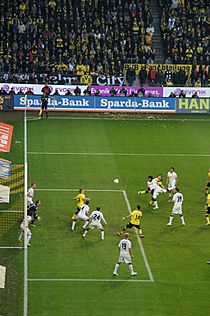
For the club's 110th anniversary, a 110-minute film about the club's history was released on DVD. In the 2010–11 DFB Cup, they reached the round of 16 for the first time in five years. In the Bundesliga, they got their first win against Bayer Leverkusen in 16 years. However, they finished the first half of the season in last place.
Due to the team's poor performance, a group of local business leaders started an "initiative Borussia." They criticized the club's management. At the 2011 Annual General Meeting, only a small number of members voted for the initiative's goals.
In a Bundesliga home game against Mainz 05, Marco Reus scored Borussia's 2500th Bundesliga goal in their 1445th game. Other players who scored milestone goals for the club were Jupp Heynckes (500th), Carsten Nielsen (1000th), Uwe Rahn (1500th), and Martin Dahlin (2000th).
In the winter break, the club signed striker Mike Hanke and reinforced their defense with Håvard Nordtveit and Martin Stranzl. On February 13, 2011, Michael Frontzeck was dismissed as coach due to continued poor results. Lucien Favre was hired as the new head coach. The team had been in last place until the 30th matchday. However, they achieved three wins in a row and finished 16th, which gave them a chance to stay in the league through relegation play-offs. Borussia played against second-division team VfL Bochum and avoided relegation with a 1–0 home win and a 1–1 draw in Bochum.
Under Favre, who took over in January 2011, Borussia Mönchengladbach aimed to return to the top of the Bundesliga. In the 2010–11 season, after a very bad first half, they managed to avoid relegation.
The following season, 2011–12, they had a strong year, competing for the championship and finishing in fourth place. They missed out on qualifying for the 2012–13 UEFA Champions League after losing to Ukrainian club Dynamo Kyiv. In the 2012–13 Bundesliga season, even after losing key players like Marco Reus, Borussia Mönchengladbach still competed for international spots and finished eighth.
In the 2013–14 Bundesliga season, they had another successful year, finishing third after the first half and ending the season in sixth place. This qualified them for the 2014–15 Europa League. They finished the 2014–15 Bundesliga season in third place, which gave them direct qualification to the 2015–16 UEFA Champions League group stage. The club was in a tough group with Juventus, Manchester City, and Sevilla. Although they finished last in the group, they earned five points, drawing twice with Juventus and beating Sevilla 4–2 at home.
After a poor start to the 2015–16 Bundesliga season, including five defeats, Favre resigned. André Schubert became the interim coach. The team's luck immediately changed, as they won six Bundesliga matches in a row. They finished the season in fourth place, qualifying for the Champions League for a second year in a row.
In the 2016–17 season, Borussia was in a difficult Champions League group but finished third, above Celtic, and qualified for the UEFA Europa League knockout phase. However, after a good start in the Bundesliga, the club had a bad run of form due to injuries and dropped to 14th place by winter. André Schubert resigned and was replaced by Dieter Hecking. Hecking started with three wins in four Bundesliga matches, and Borussia rose to ninth place. They also reached the quarter-finals of the DFB-Pokal.
Moving Up the Table (2017–Present)
The club made a new record transfer for the season, signing German international and world champion Matthias Ginter from Borussia Dortmund for 17 million euros. In the 2017–18 DFB Cup, Borussia won their first-round match against Rot-Weiss Essen 2–1. In the league opener, Die Fohlenelf won the Rheinland derby against 1. FC Köln 1–0. They finished the first half of the season in sixth place with 28 points. In the DFB Cup, Borussia was eliminated on December 20, 2017, after a 0–1 home defeat to Bayer Leverkusen. The 2017–18 season ended with Borussia in ninth place, missing out on European competitions.
In July 2018, French striker Alassane Pléa arrived from Nice for a record sum of 23 million euros. In the first round of the 2018–19 DFB-Pokal, Mönchengladbach defeated BSC Hastedt 11–1. This broke the club's previous record for the biggest win in the DFB-Pokal.
In the 2019–20 Bundesliga, Mönchengladbach started well and was at the top of the league in December 2019 after beating Bayern Munich 2–1. However, a shaky second half of the season meant they finished in fourth place, 17 points behind champions Bayern. Mönchengladbach qualified for the UEFA Champions League and was drawn against Inter Milan, Real Madrid, and Shakhtar Donetsk. Borussia achieved their largest win in the Champions League with a 6–0 victory over Shakhtar Donetsk, with Alassane Pléa scoring three goals. They advanced to the knockout stage but were eliminated in the round of 16 by Manchester City.
Club Culture and Fan Support
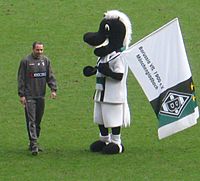
Club Songs
The official club anthem is "The Eleven of the Lower Rhine." It is sung before every home game. The song was recorded by the group BO, which is the band of the fan project.
Fan Culture
Borussia Mönchengladbach has many famous fans, including politicians and athletes. There are also fan clubs in many countries, from California to New Zealand.
Some well-known fans include "Steinwegs Mamm," who provided the drum for the team in the 1960s, and Ethem Özenrenler, known as "Manolo," who beat the drum in the northern curve of the Bökelberg Stadium for over 25 years starting in 1977.
Friendships Between Fans
FSV Mainz 05
After a DFB Cup match against Mainz 05 in 1994, a fan friendship started between Mainz and Borussia supporters. Today, only some fans still keep this friendship going.
Liverpool
There is a long-standing friendship with Liverpool fans. This friendship began because the two teams often played against each other in international games. Borussia fans often travel to Liverpool to watch their games. Liverpool fans also visit Mönchengladbach to show their mutual friendship.
In 1991, Mönchengladbach fans collected 21,000 DM (German Marks) for the families of the 96 people who died in the stadium disaster in Sheffield in 1989. They presented the money to Liverpool. For Borussia's 110th anniversary on August 1, 2010, Liverpool played a friendly match against them. Borussia won the game 1–0 in front of 51,515 fans at Borussia Park.
Club Rivalries
1. FC Köln
There is a strong rivalry between Mönchengladbach and their regional rival 1. FC Köln. This is considered Mönchengladbach's most intense rivalry. It started in 1964 when Cologne's manager, Hennes Weisweiler, moved to Mönchengladbach. Borussia's stadium is even located on a road named Hennes-Weisweiler-Allee in his memory.
This rivalry grew stronger on the field. Cologne was a founding member of the Bundesliga and its first champion. However, Mönchengladbach quickly caught up. Between the 1969–70 and 1977–78 seasons, Mönchengladbach won five championships, Cologne won one, and Bayern Munich won three.
The 1977–78 season is especially remembered by both clubs. Mönchengladbach had a huge 12–0 victory over Borussia Dortmund, which is the highest win in Bundesliga history. But Cologne won the championship with a 5–0 win over FC St. Pauli because they had a slightly better goal difference. To make it even more interesting, Cologne was then coached by Hennes Weisweiler again.
Neither club has won a Bundesliga title since the 1977–78 season, but the rivalry continues. There have been some incidents of violence between fans. Overall, Mönchengladbach has been more successful in matches against 1. FC Köln, winning 54 out of 105 games, drawing 20, and losing 31. Mönchengladbach has even won more away matches against Cologne. The first game between Borussia and FC Köln was on January 1, 1961, with Cologne winning 4–1.
Bayern Munich
Both Mönchengladbach and Bayern Munich were promoted to the Bundesliga in the 1965–66 season. Munich finished third that year, while Mönchengladbach finished 13th. Both clubs became dominant between the 1969–70 and 1976–77 seasons. Mönchengladbach won five championships, and Munich won three.
However, as Mönchengladbach's performance declined in the 1980s and 1990s, Munich became the stronger team in the Bundesliga and in head-to-head matches. Out of 119 matches played, Munich has won 61, Mönchengladbach 29, and 32 games have been draws.
Still, Mönchengladbach has sometimes surprised Bayern with big wins. For example, Igor de Camargo scored the winning goal in a 1–0 victory against Munich on August 7, 2011. Gladbach also won 2–0 in Munich in 2015, which was a rare home loss for Bayern's coach, Pep Guardiola. On October 27, 2021, Gladbach beat Bayern 5–0 in a DFB Pokal (German Cup) match. This was Bayern's worst loss in any competition since 1978.
Borussia Dortmund
While not as intense as Dortmund's rivalry with Schalke 04 or Mönchengladbach's rivalry with 1. FC Köln, Dortmund and Mönchengladbach still have a rivalry. This is mainly because both clubs are named "Borussia." Mönchengladbach fans often sing "Es gibt nur eine Borussia" (There is only one Borussia) when they play against Dortmund. The matches between the two are sometimes called the Borussengipfel, or "Borussia Summit," by the media.
Club Sponsors and Kit Manufacturers
| Year | Shirt sponsor | Branch |
|---|---|---|
| 1976–1980 | Erdgas | Energy/Natural gas |
| 1980–1983 | Datsun | Cars |
| 1983–1990 | Erdgas | Energy/Natural gas |
| 1990–1992 | Tuborg | Brewery |
| 1992–1994 | Trigema | Sportswear |
| 1994–1997 | Diebels | Brewery |
| 1997–2002 | Belinea | Hardware |
| 2002–2005 | Jever | Brewery |
| 2005–2009 | Kyocera | Electronics and ceramics |
| 2009–2020 | Postbank | Retail banking |
| 2020–2024 | flatex | Online broker |
| 2024–present | Reuter | Online bathroom retailer |
| Year | Manufacturer |
|---|---|
| 1976–1992 | Puma |
| 1992–1995 | ASICS |
| 1995–2003 | Reebok |
| 2003–2013 | Lotto |
| 2013–2018 | Kappa |
| 2018–present | Puma |
Players and Staff
Current Squad
|
|
Players on Loan
|
Retired Numbers
- 12 – the 12th man, dedicated to fans
Coaching and Backroom Staff
Staff for the 2023–24 season:
| Role | Nation | Name |
|---|---|---|
| Sporting director | Roland Virkus | |
| Head coach | Gerardo Seoane | |
| Assistant coach | Patrick Schnarwiler | |
| First-team coach | Christopher John | |
| First-team coach | Oliver Neuville | |
| Goalkeeping coach | Uwe Kamps | |
| Goalkeeping coach | Fabian Otte | |
| Transition area coach | Eugen Polanski | |
| Athletic coach | Alexander Mouhcine | |
| Athletic coach | Jonas Rath | |
| Athletic coach | Markus Müller | |
| Team doctor | Dr. Heribert Ditzel | |
| Team doctor and orthopedic surgeon | Dr. Stefan Hertl | |
| Team doctor and orthopedic surgeon | Ralf Doyscher | |
| Physiotherapist | Holger Wagner | |
| Physiotherapist | Hendrik Schreiber | |
| Physiotherapist | Dirk Müller | |
| Physiotherapist | Adam Szordykowski |
History of Head Coaches
| Borussia Mönchengladbach coaching history from 1946 to present | |
|---|---|
|
|
UEFA Club Rankings
| Rank | Team | |
|---|---|---|
| 46 | 34.000 | |
| 47 | 33.500 | |
| 48 | 33.000 | |
| 49 | 33.000 | |
| 50 | 24.000 |
Club Achievements and Trophies
Borussia Mönchengladbach's five Bundesliga championships mean the club can display two gold stars on their badge.
National Titles
- Bundesliga
- Winners: 1969–70, 1970–71, 1974–75, 1975–76, 1976–77
- Runners-up: 1973–74, 1977–78
- 2. Bundesliga
- Winners: 2007–08
- DFB-Pokal (German Cup)
- Winners: 1959–60, 1972–73, 1994–95
- Runners-up: 1983–84, 1991–92
- German Supercup
- (Unofficial winners): 1977
European Titles
- European Cup
- Runners-up: 1976–77
- UEFA Cup
- Winners: 1974–75, 1978–79
- Runners-up: 1972–73, 1979–80
International Titles
- Intercontinental Cup
- Runners-up: 1977
Youth Titles
- German Under 17 Champions
- Winners: 1981
- Under 17 Bundesliga West
- Winners: 2009
Double Wins
- 1974–75: League and UEFA Cup
Records and Statistics
Most Appearances in Bundesliga
| Rank | Player | Matches |
|---|---|---|
| 1 | 419 | |
| 2 | 390 | |
| 3 | 366 | |
| 4 | 351 | |
| 5 | 339 | |
| 6 | 331 | |
| 7 | 321 | |
| 8 | 290 | |
| 9 | 284 | |
| 10 | 283 |
Top Scorers for the Club
| Rank | Player | Goals |
|---|---|---|
| 1 | 195 | |
| 2 | 97 | |
| 3 | 92 | |
| 4 | 82 | |
| 5 | 81 | |
| 6 | 76 | |
| 7 | 75 | |
| 8 | 71 | |
| 9 | 68 | |
| 10 | 61 |
Record Matches
Unofficial Record
 Borussia Mönchengladbach 21–4 Vatican City
Borussia Mönchengladbach 21–4 Vatican City 
- (Mönchengladbach, Germany; August 13, 2016)
Official Record
 Borussia Mönchengladbach 12–0
Borussia Mönchengladbach 12–0
 Borussia Dortmund
Borussia Dortmund- (Düsseldorf,Germany; April 29, 1978)
Players' Individual Honours
For a list of every Borussia Mönchengladbach player with 100 or more appearances, see List of Borussia Mönchengladbach players
Players from the club have received the following awards:
- Ballon d'Or
-
- 1977:
 Allan Simonsen
Allan Simonsen
- 1977:
- Player of the Year – Germany
-
- 1971:
 Berti Vogts
Berti Vogts - 1972:
 Günter Netzer
Günter Netzer - 1973:
 Günter Netzer
Günter Netzer - 1979:
 Berti Vogts
Berti Vogts - 1987:
 Uwe Rahn
Uwe Rahn - 2012:
 Marco Reus
Marco Reus
- 1971:
- Player of the Year – Austria
-
- 1986:
 Anton Polster
Anton Polster - 1997:
 Anton Polster
Anton Polster
- 1986:
- Player of the Year – Belgium
-
- 2001:
 Wesley Sonck
Wesley Sonck
- 2001:
- Player of the Year – Sweden
-
- 1993:
 Martin Dahlin
Martin Dahlin - 1995:
 Patrik Andersson
Patrik Andersson - 2001:
 Patrik Andersson
Patrik Andersson
- 1993:
- Bundesliga Top Scorers
-
- 1974 – 30 Goals –
 Jupp Heynckes (tied with Gerd Müller of Bayern Munich)
Jupp Heynckes (tied with Gerd Müller of Bayern Munich) - 1975 – 29 Goals –
 Jupp Heynckes
Jupp Heynckes - 1987 – 24 Goals –
 Uwe Rahn
Uwe Rahn - 1995 – 20 Goals –
 Heiko Herrlich (tied with Mario Basler of Werder Bremen)
Heiko Herrlich (tied with Mario Basler of Werder Bremen)
- 1974 – 30 Goals –
- Goal of the Year
-
- 1971:
 Ulrik Le Fevre
Ulrik Le Fevre - 1972:
 Günter Netzer
Günter Netzer - 1973:
 Günter Netzer
Günter Netzer - 1978:
 Rainer Bonhof
Rainer Bonhof - 1979:
 Harald Nickel
Harald Nickel - 2005:
 Kasper Bögelund
Kasper Bögelund - 2006:
 Oliver Neuville
Oliver Neuville
- 1971:
- Goal of the Season
-
- 2012–13:
 Juan Arango
Juan Arango - 2020–21:
 Valentino Lazaro
Valentino Lazaro
- 2012–13:
Images for kids
-
Game scene from the final of the UEFA Cup 1975, with FC Twente
-
Berti Vogts in a running duel with Johan Cruyff in the World Cup final of 1974
See also
 In Spanish: Borussia Mönchengladbach para niños
In Spanish: Borussia Mönchengladbach para niños
 | Lonnie Johnson |
 | Granville Woods |
 | Lewis Howard Latimer |
 | James West |


